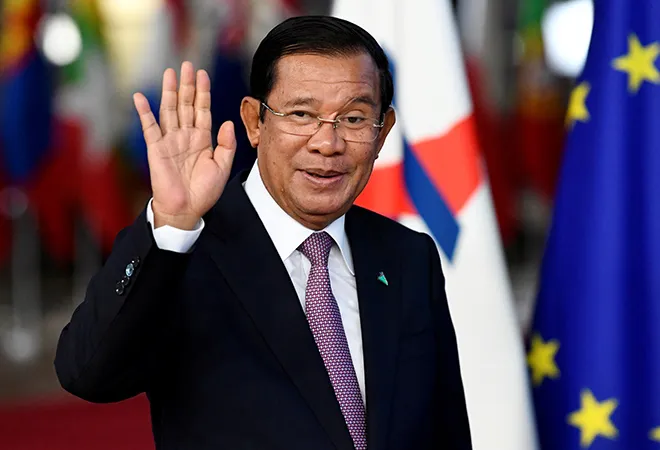
Three days after the ruling Cambodian People’s Party (CPP) declared a landslide election victory on 23 July, long-time Cambodian leader Hun Sen
announced that he would resign as prime minister and pass the baton to his son, Hun Manet, who was, until recently, the commander of the Royal Cambodian Army. While there has been speculation over the potential foreign policy of the Western-educated Hun Manet, it is important to remain objective in assessing the potential foreign policy pathways of Phnom Penh, given the tumultuous fluctuations that continue to exacerbate Southeast Asia’s security architecture.
Cambodia lies at the geopolitical and economic crossroads between the United States (US)—and the rest of the West—and China. While the US and the European Union (EU) are the Southeast Asian country’s largest export markets, China has cemented its position as Cambodia’s top
investor and donor, as it continues to facilitate significant contributions to the Cambodian national economy. However, the trajectory of economic ties between Phnom Penh and the West continues to critically fluctuate because of the characteristics of Cambodia’s domestic political system. For instance, due to human rights and political transparency concerns, the EU
decided to reimpose trade duties reaching 20 percent on Phnom Penh’s exports in 2020. Eventually, such challenges in its relations with the West pushed it closer to China.
While there has been speculation over the potential foreign policy of the Western-educated Hun Manet, it is important to remain objective in assessing the potential foreign policy pathways of Phnom Penh, given the tumultuous fluctuations that continue to exacerbate Southeast Asia’s security architecture.
Like many other Southeast Asian countries, Cambodia is consistently protective and sensitive vis-à-vis its national affairs. Southeast Asia is composed of dynamic countries that greatly vary in systems of government, domestic political structures, political ideologies, and interests. Such sensitivities towards political autonomy have led to the establishment of the norm of non-interference, which continues to serve as a major cornerstone of the Association of Southeast Asian Nations (ASEAN). In addition to a shared history of colonialism, there is evidently a natural wariness among Southeast Asian countries towards extra-regional powers that do not share similar sentiments or a level of inclusivity towards their national processes—especially since such processes continue to strengthen the national seat of power of current administrations. Because of this, the past few years witnessed the souring of relations between the US and Cambodia, resulting in closer ties between Phnom Penh and Beijing.
In terms of foreign direct investments (FDI), China
accounted for 44 percent of the total FDI Cambodia received between 1994 and 2021. In fact, despite the commercial constraints posed by the COVID-19 pandemic, investments from China in Cambodia continued to rise at
substantial levels. In the defence realm of bilateral cooperation between Phnom Penh and Beijing, a series of recent unprecedented developments were also witnessed. In 2022, the Chinese and Cambodian armies
signed a memorandum of understanding (MoU), which illustrated the mutual desire of both countries to strengthen their regional security partnership.
Cambodia is consistently protective and sensitive vis-à-vis its national affairs. Southeast Asia is composed of dynamic countries that greatly vary in systems of government, domestic political structures, political ideologies, and interests.
Additionally, as a sign of the broadening of bilateral military relations, China and Cambodia
conducted naval drills for the first time in Cambodian waters on 20 March. Moreover, it was also
reported by the
Financial Times that the China-led construction at Cambodia’s Ream Naval Base is nearing completion, as it continues to possess an uncanny resemblance to a pier that the Chinese military utilises at its sole offshore military base in Djibouti. Given the possibility of the Cambodian base serving as an avenue for China to project more power in the region at the expense of US influence and the rules-based order, Washington warned Phnom Penh of the
consequences such actions can result in. Moreover, this may also lead to more economic sanctions, which may hamper the trade privileges Cambodia enjoys through the Generalised System of Preferences (GSP) and Everything but Arms (EBA).
With the Hun Manet government eventually taking charge, it remains to be seen exactly how Cambodian external relations will evolve. While there is
speculation that the son will be more oriented and flexible towards the US and Europe because of his academic background, such assumptions are quite simplistic given the fact that several leaders in Asia who have completed their education in either North America or Europe have not always reflected a Western-oriented perception in national politics and external relations. Eventually, this will boil down to the forces of nationalism, the level of domestic resources, and the degree of political and economic interdependence at the international level. Therefore, it is not likely for Phnom Penh to immediately lessen its proximity with China.
In the defence realm of bilateral cooperation between Phnom Penh and Beijing, a series of recent unprecedented developments were also witnessed.
Nevertheless, it is a rash generalisation to assume that Cambodia is unfazed by its increasing dependence on Beijing. Phnom Penh is aware of the potential challenges that may arise from falling deeper into China’s orbit; hence, the Southeast Asian country has often expounded on a
balanced foreign policy between Beijing and Washington. However, if Cambodia’s domestic political conditions are going to persist, along with the intensifying US-China power competition in the region, it will be more difficult for Phnom Penh to strike a sustainable balance between the two structural forces in the long term. Therefore, the challenge for the Hun Manet government will be to manage an already problematic hedging strategy between Beijing and Washington. Since it seems that Phnom Penh will not be able to do this on its own, it may have to leverage its relations with other emerging Asian powers such as India and Japan to serve as a strategic buffer amidst the troubled US-Cambodia-China triangle.
Such realisations were recently put into action. In January, Cambodian Deputy Prime Minister, Prak Sokhonn, met Japanese Foreign Minister, Yoshimasa Hayashi, in Tokyo
to explore avenues where both countries can bolster their newly elevated comprehensive strategic partnership amidst the uncertainties facing the region’s security architecture. Similarly, Phnom Penh has also recently sought to foster closer strategic ties with India. Along with India’s
offer of a line of credit amounting to US$50 million for the procurement of defence equipment, the number of goodwill visits by the Indian Navy and Coast Guard to Cambodia has also
significantly increased. Moreover, as a symbol of both countries’ willingness to deepen the scope of their bilateral defence partnership, the Indian and Cambodian Armies
held their first bilateral dialogue in April. In fact, based on the prominent 2023 State of Southeast Asia Survey by the ISEAS Institute, respondents from Cambodia
ranked Japan and India as Phnom Penh’s top two alternative strategic partners at a time when the US-China power competition continues to intensify; other countries included Australia, South Korea, and the United Kingdom.
Phnom Penh is aware of the potential challenges that may arise from falling deeper into China’s orbit; hence, the Southeast Asian country has often expounded on a balanced foreign policy between Beijing and Washington.
However, while Phnom Penh has been endeavouring to diversify its strategic partners in both the economic and defence domains, the level of such diversification remains limited and underutilised. Until Cambodia is able to maximise its ties with other partners, it will continue to face the challenges brought upon by the exacerbating US-China competition in Southeast Asia. Therefore, if Cambodia continues to remain reactive in its foreign policy, it may eventually be forced to compromise its economic and security interests further due to the pressures applied by the intensifying structural forces.
Don McLain Gill is a Philippines-based geopolitical analyst, author, and lecturer at the Department of International Studies, De La Salle University (DLSU).
The views expressed above belong to the author(s). ORF research and analyses now available on Telegram! Click here to access our curated content — blogs, longforms and interviews.



 Three days after the ruling Cambodian People’s Party (CPP) declared a landslide election victory on 23 July, long-time Cambodian leader Hun Sen
Three days after the ruling Cambodian People’s Party (CPP) declared a landslide election victory on 23 July, long-time Cambodian leader Hun Sen  PREV
PREV


